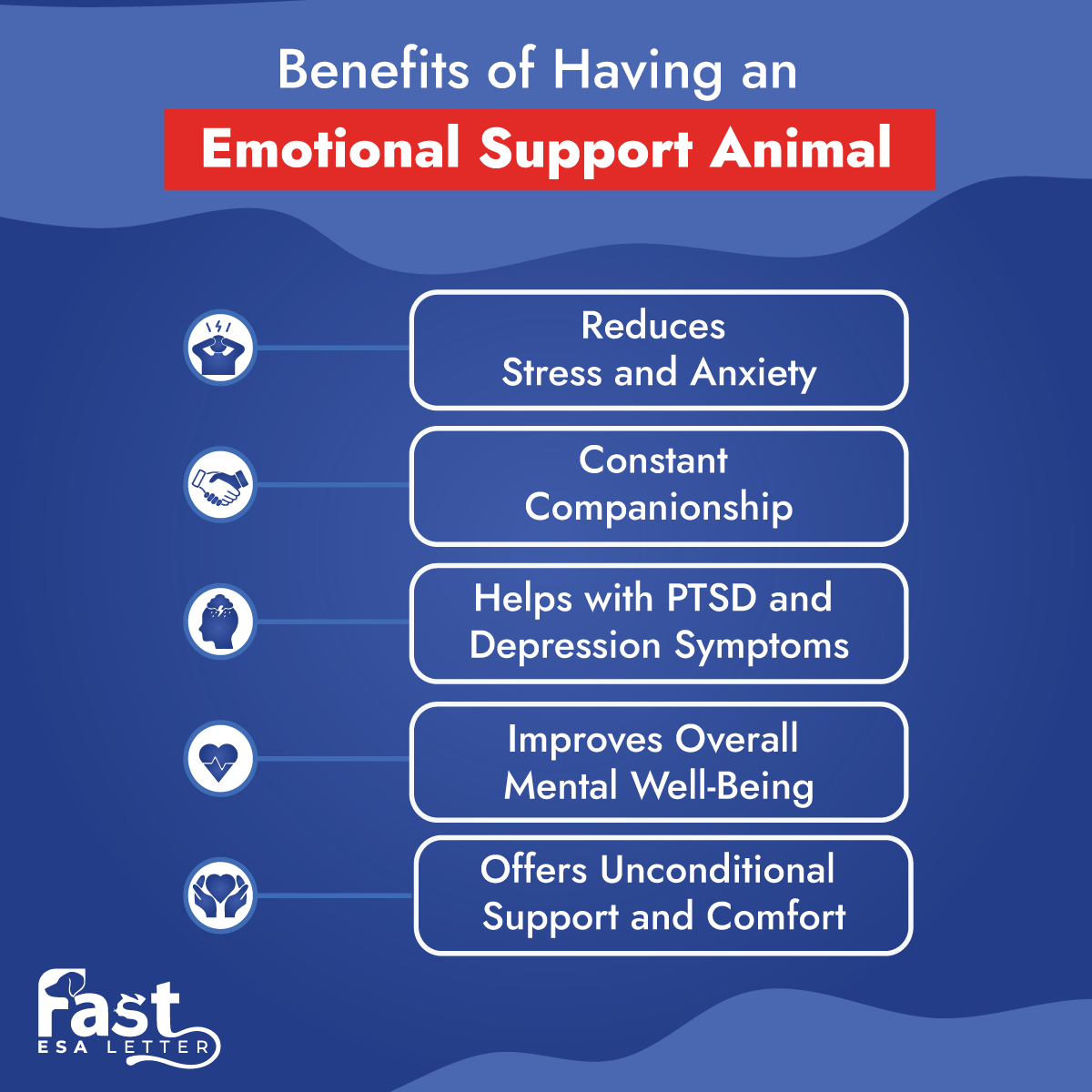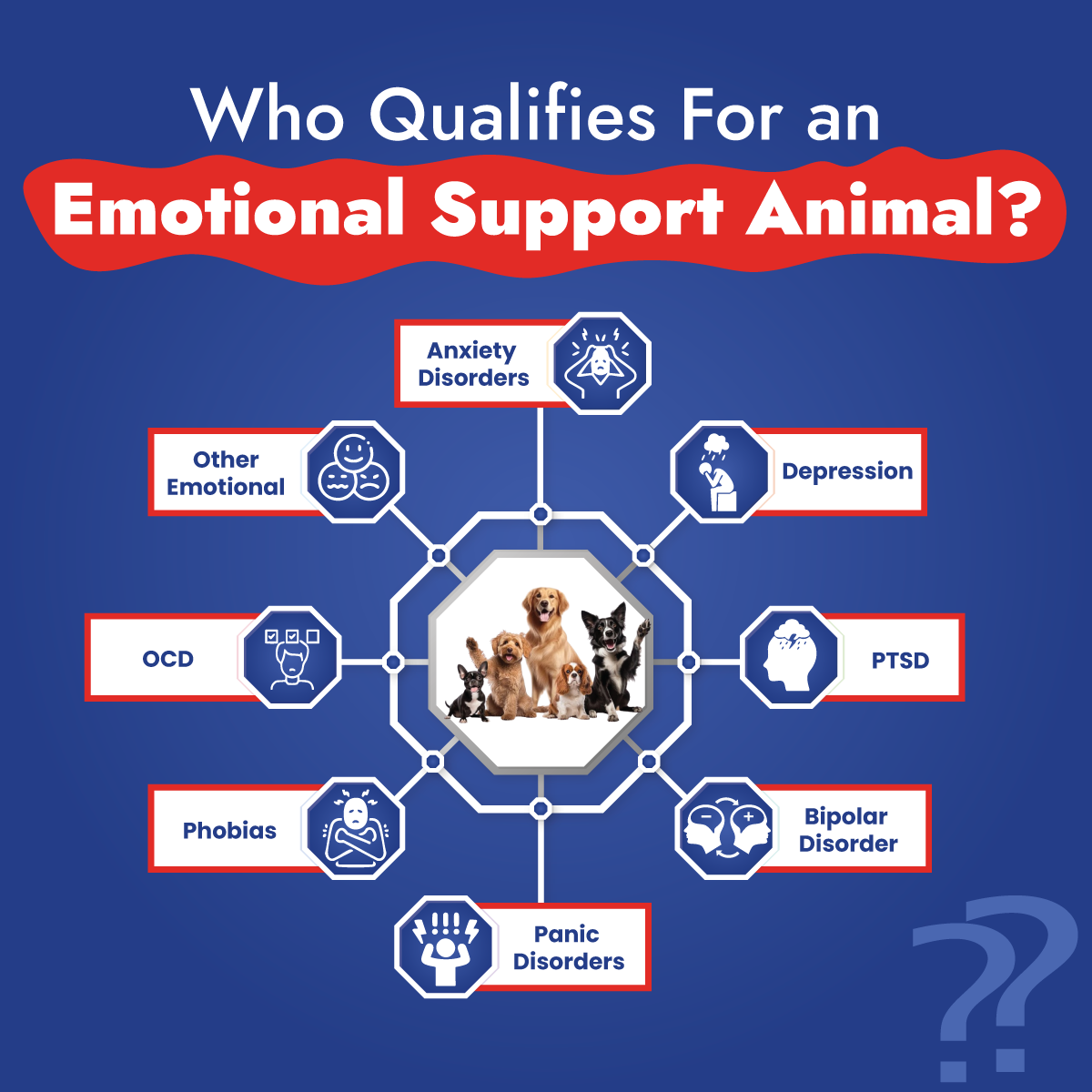Emotional support animals help military personnel manage PTSD and anxiety by providing comfort and emotional stability. To secure their legal rights, individuals must have a valid ESA letter from a licensed mental health professional.
Emotional Support Animal: What You Need to Know in 2025.
An ESA offers comfort and support for mental health, helping with anxiety, depression, or PTSD. No special training needed, but they come with housing rights!

Robert Clendenin, MD
Live Free with Your ESA!
An ESA Letter Unlocks Freedom!
Your Pet Deserves a Home!
An ESA Letter makes it possible.

Benefits of Having an Emotional Support Animal
Having an ESA comes with numerous mental health benefits that can positively impact quality of life. Here are some of the most notable benefits:
- Reduces Stress and Anxiety
- Constant Companionship
- Helps with PTSD and Depression Symptoms
- Improves Overall Mental Well-Being
- Offers Unconditional Support and Comfort

Laws Relating to Emotional Support Animal
Emotional Support Animals are recognized under specific federal laws like the Fair Housing Act (FHA), which protects the rights of ESA owners in certain situations.
- Housing: Under the FHA, individuals with an ESA are permitted to live with their animal in housing units, even where “no pets” policies exist. To qualify, owners may need to provide valid documentation, such as an ESA letter, from a licensed mental health professional.
- Travel: The Air Carrier Access Act (ACAA) previously required airlines to accommodate ESAs. However, recent changes now allow individual airlines to decide their own policies regarding ESAs. While some airlines still permit ESAs to travel in the cabin, others may classify them as pets, which may require additional fees and restrictions.
State-Specific ESA Laws
Some states impose additional requirements for ESA documentation. Notably, in Arkansas, California, Iowa, Louisiana, and Montana, new laws mandate that individuals seeking an ESA letter must establish a client-provider relationship with a licensed mental health professional for at least 30 days before they can receive valid documentation. This typically requires two consultations with the provider prior to qualifying for an ESA letter.
Note: As ESA regulations can vary significantly by state, it’s important to review your state’s specific ESA laws to ensure compliance with any unique requirements or restrictions.
Who Qualifies For an Emotional Support Animal?

Types of Emotional Support Animals
Emotional Support Animals aren’t limited to dogs. While dogs and cats are the most common ESAs, other animals like birds, rabbits, and even miniature horses can serve as ESAs if they provide significant emotional support. Choosing the right type of animal depends on your needs, preferences, and living situation.
- Dogs: Known for loyalty and companionship, dogs are ideal for active individuals.
- Cats: Cats offer a calming presence and can thrive in small living spaces.
- Other Animals: Birds, rabbits, and miniature horses can also serve as ESAs, each bringing unique benefits to their owners.
How ESAs Differ from Service Animals (SA) and Therapy Animals (TA)
| Feature | ESA | SA | TA |
|---|---|---|---|
| Protections | Covered by FHA. | Covered by FHA, ADA, and ACAA. | Covered by ADA. |
| Access | Housing only. | Housing, Public Access, and Air Travel. | Permitted in specific settings. |
| Services | Emotional Support. | Performe disability related tasks. | Providing comfort in group settings. |
| Documents | ESA letter. | PSD Letter. | Permission from host locations. |
| Air Travel | Not covered. | Covered. | Not covered. |
Frequently Asked Questions (FAQs)
Do Emotional Support Animals Have To Be Trained?
Can A Landlord Deny My Emotional Support Animal?
Under the Fair Housing Act, landlords generally cannot deny ESAs, but they may require proper documentation, and certain conditions apply for housing exemptions.
How Do I Get My Dog Certified As An ESA?
ESAs do not require certification. Instead, you need an ESA letter from a licensed mental health professional.
Can Emotional Support Animals Go To Work With Me?
Can More Than One Person In A Household Have An ESA?
What Disabilities Qualify For An Emotional Support Animal?
Does An Emotional Support Animal Count As A Service Animal?
What Happens If My ESA Causes Property Damage?
Can A College Dorm Refuse My Emotional Support Animal?
How Is An ESA Different From A Pet?
Can An Emotional Support Animal Be Claimed On Taxes?
Can An HOA Deny Emotional Support Animals?
Generally, an HOA cannot deny a valid emotional support animal request if the resident has a documented need for the animal to assist with a disability. Under the FHA, HOAs must make reasonable accommodations for emotional support animals, even if the property has a “no pets” policy. However, an HOA can deny the request if the animal poses a direct threat to others’ safety, causes significant property damage, or if the request would create an undue burden.
Is Identification Required For An Emotional Support Animal?
No, there is no legal requirement for an emotional support animal to wear identification, such as a vest or tag. However, some owners choose to have their ESA wear identification to help signal its role to others and reduce potential questions or confusion in public places.
More on Emotional Support Animals
How Emotional Support Animals Help Veterans Reclaim Peace After Service?
How Emotional Support Animals Help Veterans Reclaim Peace After Service?Emotional Support Animals (ESAs) offer comfort and stability to veterans coping with PTSD, anxiety, and depression. They support veterans in rebuilding emotional resilience,...
Think Your ESA Is Illegal? These Laws May Surprise You.
Breed restrictions do not typically apply to Emotional Support Animals (ESAs) under the Fair Housing Act (FHA). Landlords must accommodate ESAs regardless of breed, as long as they have proper documentation. However, airlines and other entities may have different policies regarding breed restrictions.
Can a Guinea Pig Be an Emotional Support Animal?
Yes, Guinea pigs can be a wonderful choice for emotional support animals. They offer comfort and companionship through their friendly behaviour. To have a guinea pig as an ESA, you’ll need an ESA letter from a licensed mental health professional.
Can A Hamster Be An Emotional Support Animal?
Yes, a hamster can serve as an emotional support animal (ESA). These small, low-maintenance pets can provide significant emotional comfort and companionship for individuals dealing with mental or emotional challenges. Their compact size and ease of care make them an ideal choice for those who may not have space for larger animals.
Who Can Write an Emotional Support Animal Letter?
An emotional support animal (ESA) letter can only be written by a licensed mental health professional, such as a therapist, psychologist, psychiatrist, or counselor. The professional must evaluate your mental or emotional condition and determine that an ESA would benefit your well-being.
What Is an ESA Letter?
An ESA letter is a prescription by a mental health professional stating that an animal provides emotional support for a person with a mental health condition.
How to Get a Refund on Pet Deposit for Emotional Support Animals
To successfully get a pet deposit refund for your ESA, submit a valid ESA letter from a licensed mental health professional to your landlord, stating your need for the animal as a reasonable accommodation under the Fair Housing Act. Politely request the refund and follow up if needed, as landlords cannot legally charge pet deposits or fees for ESAs.
Can A Rottweiler Be An Emotional Support Dog?
Yes, a Rottweiler can be an Emotional Support Dog. Their loyalty, calm temperament, and strong bond with their owners make them well-suited for providing emotional support.
Can a Pitbull Be An Emotional Support Animal?
Yes, a Pitbull can be an Emotional Support Animal (ESA). The breed is known for its loyalty and affectionate nature, which make them excellent ESAs.
Can I Bring an Emotional Support Animal to School?
Bringing an Emotional Support Animal (ESA) to school depends on the institution’s policies. While ESAs are not recognized as service animals under the ADA, some schools may allow them in certain areas. Therefore, it is essential to check your school’s specific rules.
How to Register an Emotional Support Animal?
To register an Emotional Support Animal (ESA), first obtain an ESA letter from a licensed mental health professional. You can then add your animal to a private database, which provides a registration ID. However, note that registration offers no legal benefits beyond the ESA letter.
Emotional Support Animals for Cancer Patients: Understanding the Role in Treatment.
Emotional Support Animals (ESAs) play a vital role in the treatment and well-being of cancer patients. They provide companionship, reduce stress, and help alleviate anxiety and depression often associated with cancer treatment. By offering comfort and care, ESAs improve patients’ overall quality of life during their recovery journey.
How to Choose the Right Type of Animal as an Emotional Support Animal?
Choosing the right ESA depends on your lifestyle, mental health needs, and allergies. Consider the animal’s temperament, size, and care requirements. The most important factor is finding an animal that brings you comfort and helps you manage your emotions.
How to Fly With An Emotional Support Animal?
Flying with an Emotional Support Animal (ESA) requires understanding updated airline policies. Since 2021, most U.S. airlines no longer recognize ESAs as service animals under the Air Carrier Access Act, treating them as regular pets. Passengers may need to pay pet fees and comply with size, weight, and carrier restrictions when bringing ESAs on board.
The Role of Emotional Support Animals in Managing Symptoms of Multiple Sclerosis.
Emotional Support Animals (ESAs) play a vital role in managing symptoms of Multiple Sclerosis by reducing stress, anxiety, and depression, which are common among patients. Their companionship can improve emotional well-being, provide motivation for physical activity, and create a sense of routine, positively impacting mental and physical health in MS management.
How Many Emotional Support Animals Can I Have at one time?
There’s no legal limit to the number of Emotional Support Animals (ESAs) you can have. Each ESA must be essential for your well-being and should be recommended by a licensed mental health professional.
Autism and Emotional Support Animals.
Emotional Support Animals (ESAs) provide crucial support for individuals with autism by offering companionship and reducing feelings of anxiety and isolation. Their presence can help create a calming environment, aiding in emotional regulation and improving social interactions.
Where Can I Take Emotional Support Animals?
You can take your emotional support animal to your house, college dorms, and pet-friendly public places. Some states, like California, allow ESAs in the workplace, but specific rules and policies vary by state.
Emotional Support Animal for ADHD, Here’s What You Need to Know
Incorporating an emotional support animal into your life can provide valuable companionship and stability while managing your ADHD. They can significantly enhance your emotional well-being and daily functioning.
Benefits of Having an Emotional Support Animal
Emotional Support Animals (ESAs) provide emotional stability, reducing stress, anxiety, and depression through companionship. They promote mental well-being, encourage routine, and foster a sense of purpose. While beneficial, ESAs complement but don’t replace professional mental health treatments.
Can My Veterinarian Writes an ESA Letter For Me?
No, Veterinarians cannot write an ESA letter because they are not legally qualified in the field of mental health. Only a licensed mental health professional, can provide a valid ESA letter. It’s best to consult with a qualified therapist or doctor to ensure the letter meets legal requirements.
Can Cats Be Emotional Support Animals?
Yes, cats can be excellent emotional support animals (ESAs). They provide companionship and emotional support to individuals with mental health conditions. To officially designate your cat as an ESA, you’ll need an ESA letter from a mental health professional.
Signs That Indicate You Need an Emotional Support Animal.
Experiencing persistent feelings of loneliness, anxiety, or depression may indicate the need for an Emotional Support Animal (ESA). ESAs can provide companionship and emotional stability, helping to alleviate such symptoms. Additionally, if you struggle with establishing a daily routine or find it challenging to manage stress, an ESA might offer the support needed to improve your mental well-being.
How to Get an ESA Letter for Kids: Parent’s Guide
To get an ESA letter for your child, you’ll need to consult with a licensed mental health professional who can evaluate your child’s needs and determine if an ESA would be beneficial.
How to Ask Doctor for Emotional Support Animal?
To ask your doctor for an ESA letter, schedule an appointment, and prepare a list of information to discuss. Openly share your mental and emotional challenges, explaining how your pet helps you cope. Then, ask if they can write an ESA letter, highlighting the benefits and special rights it would provide.
Can a Landlord Refuse Emotional Support Animals?
No, a landlord cannot refuse emotional support animals based on breed, weight, or size. Under the Fair Housing Act, landlords must make reasonable accommodations for ESAs unless the animal poses a direct threat to health and safety or causes significant property damage.


